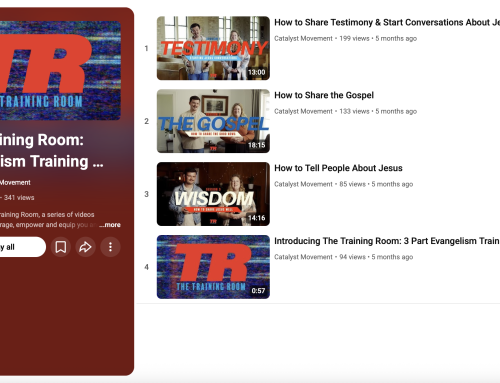I’m privileged in this season to be facilitating regular discussion groups about outreach with both a group of senior pastors, and also a group of youth leaders.
I’m taking to both groups about youth ministry, and here is why.
A point that many senior church leaders might not like
I think senior church leaders (meaning the older ones who’ve done stuff) have a role to play in youth ministry. Not to lead it – but to disciple the leaders. And I think we have a systemic (repeating) culture of not doing very well in this training of our best younger leaders (who lead our youth groups and young adult ministries).
Why?
Most youth and young adult leaders will finish in their roles before they’ve even learnt the stuff some of us could quite easily teach them, were there a culture of discipling our leaders!
This means we have systemic (repeating) ‘holes’ and problems, which leave us (a) weak in witness and (b) weak in discipleship – which positions us to lose most of those who join our groups also!
> To grow God’s Church it’s not just about reaching people. We also need to close the back door.
The biggest back door in the Church
The biggest ‘’back door’ is the 18 to 22yo age bracket, in which it’s estimated that 2/3 of the youth in our churches walk from the faith.
Young Adult ministry is therefore the destiny of every youth pastor – because they’ll care about the fact that so many leave the faith!
However, those who are ‘senior leaders’ – referring to the the older one’s who have done stuff (noting there are older leaders who have not done stuff too / age doesn’t always mean wisdom) have a role to play. There are keys to consider – and things we can teach our youth and young adult leaders that can help them.
As a possible resource
…for youth and young adult leaders to learn from, and also for senior leaders to use as a discussion resource (to disciple your youth and young adult leaders with)
I wrote a book on youth and young adult leadership approx 14 years ago. It is only online (never printed) at
https://alltogether.co.nz/the-what-and-how-of-youth-ministry/
Take a look to see the chapter titles – while noting there is significant substance in the support resources (at the bottom) also. I wrote this, and put the resources together, to help youth and young adult leaders I knew – so I spared no effort, because this was about meeting real needs, which were costing them (they were losing people because of what they didn’t yet know how to do)!
There is plenty to discover in this resource!
The relevant chapters to today’s topic are #10 and #11. I’ll let them speak for themselves. Here one more point, and an application point for youth and young adult leaders – and separately for senior leaders.
Another ‘back door’ to note
Another noted ‘gap’, where people leave church, is the integration from Sunday School to youth group. Some pastors suggest as many as 1/3 do not make that transition. Part of the challenge is that many parents then allow their youth to decide if they come to church at all.
If this is true, this would likely be the second most significant ‘back door’ in our churches.
> There is a chapter in the book specifically on this integration / transition also. It was written after having faced this challenge – having then applied principles that greatly improved things. In that season we”d have about 15 kids per year ‘graduate’ out of the Sunday School to the youth ministry – while we’d graduate about 35 to 45 per year out to the young adults ministry (the growth being from new youth who gave their lives to Christ). See Chapter 3. (Note – in Singapore where I was when I wrote this, ‘P6′ is the 12 year olds in their school system – so I used the term ‘P6’ so it made sense).
Application for youth and young adult leaders
Please read those chapters – then the whole book. Print it – write on it – note the many points you could apply – and consider how then you’ll do that.
Is doing this worth it? INTENTIONALITY is the key word for a disciple-maker. If you lead randomly – I suggest you’ll get random results, and also the fact that there might be some good results in that picture doesn’t fully justify the process. If we are intentional, without question we’ll get better results! Leadership can be learnt. We can grow in it!
An important understanding. There are things we don’t know that we don’t know – which makes learning those things difficult (because we don’t know we don’t know them)
I’m now in my late 40s. I could not have imagined at age 30, with theological training behind me, plus a decade of ministry (7 years in one place and in my 3rd year in another), and on two continents, and with various successes in both ‘assignments’… what I know today. Also, those things I then learnt enabled increased fruit!!
If you don’t know you don’t know stuff – it’s a bit like pride. You won’t be ready to learn – which means you will probably repeat the mistakes of the who went before you. So, realising you might not know some things – despite your amazing experience and all you have already learnt, is a beginning point.
> What if there is wisdom in the book I just referred you to? What if there are things in it – and the resources – and approaches to leadership – that could change the way you lead, enabling increased fruitfulness in the 4 to 5 decades of ministry you might yet have ahead of you?
Application for senior leaders
I suggest we’d all do well to intentionally and very deliberately disciple our youth and young adult leaders in leadership – rather than only letting them grow through their own experiences, because most of our youth and young adult leaders will be leaving their roles before they’ve even worked a lot of this stuff out!!!
To even take the above book, with its 15 chapters – one discussion per week, would mean you facilitated learning 15 times.
They’d know things through that they they might NEVER learn in their lifetime otherwise. Their leadership would be strengthened both now, and into the coming 4 or 5 decades of service to God that might yet be ahead of them!
Many of the challenges in youth and young adults ministry in our churches are systemic (repeated again and again).
Intentionality in our leadership as senior leaders is the only way to break that cycle!




